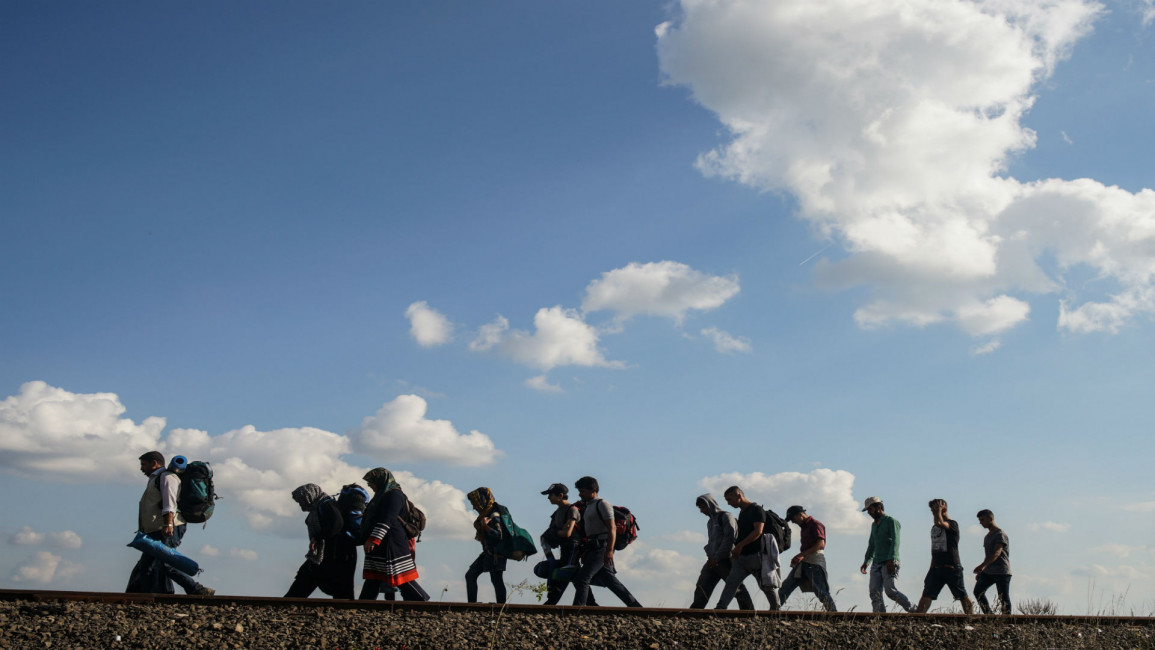
The Syrian displacement and the moral duty of intellectuals
The picture of the Syrian child Aylan Abdullah Kurdi will serve as a testament to the catastrophe suffered by the Syrian people in the 21st century, just as Handala - as depicted by the late Palestinian artist Naji al-Ali - represented the catastrophe of the Palestinian people in the 20th century.
Aylan the Syrian and Handala the Palestinian have become icons of their people's displacement.
Aylan's calm body that surrendered to its fate after the sea ejected it upon a stormy night broke the false tranquility of the Marmara coast, while Handala immortalised the suffering of Palestinian children by turning his back on a world that forsook him and left him travelling the journey of his exile barefoot.
| The irony of this large scale Syrian displacement is the deafening silence that has been the salient reaction in our part of the world |
Between the Palestinian and Syrian disasters, the entire Arab world faces a disaster of its own - as each Arab nation is suffering its own displacement.
In Yemen, the displacement has no compass, and in Iraq it takes a sectarian dimension - while in Libya it is shaded by the war waged between brothers.
The picture of lost refugees at the borders of Arab countries or those traversing swelling seas or attempting to cross fenced European borders have become a news staple, just as the pictures of killings and beheadings have become regular items in Arab news bulletins.
The Syrian displacement is not only the largest displacement of a population in recent times, but also epitomises the term "displacement" with all its implications of exile, exodus, pain and loss.
All of these terms are fitting for the suffering of the Syrian people who were forced to escape their country under the barrel bombs of Bashar al-Assad and the public executions of the Islamic State group.
And while they found Arab borders closed in their faces, they had no choice but to head westwards - losing both their homeland and direction.
The irony of this large-scale Syrian displacement is the deafening silence that has been the salient reaction in our part of the world.
While Arab populations, intellectuals, scholars and leaders are silent, numerous western cities such as London, Rome, Madrid, Copenhagen, Munich and Nice have witnessed an outpouring of solidarity with the displaced Syrian people.
The French president, Francois Hollande, made a surprise visit to a Syrian refugee encampment near Paris and promised to speed up their asylum applications. The British prime minister, David Cameron, flew to Lebanon to visit the refugee camps that housed people fleeing from Assad's barrel bombs.
Meanwhile, on the southern shores of the Mediterranean, a morbid silence hangs over the lavish palaces of Arab leaders.
Arab intellectuals remained silent while their western counterparts called on their governments to take immediate action to solve the crisis of the thousands of refugees who have arrived in Europe, and condemned the behaviour of individuals and groups that deal with foreigners with hatred, racism and violence.
| Have Arab intellectuals completely lost their ability to feel and be moved? |
Arab populations might be excused for their silence as they are also living in dire conditions - and trying to hold Arab officials to account for their inaction will not yield any results, as this is not the first time they have stood by and watched disasters affect their neighbours.
However, the resignation of Arab intellectuals from performing their moral duty is completely inexcusable.
Have Arab intellectuals completely lost their ability to feel and be moved? The tragedy of the Syrian child Aylan Kurdi is no less painful than the tragedy of the Palestinian child Mohammed al-Durrah.
At the time of Durrah's murder at the hands of Israeli soldiers, there was still some life in the Arab body, but it seems like that is now long gone.
Please forgive us, Aylan. Your picture hurt and saddened us. And thank you for not turning around and showing us your anger and sadness that will forever haunt us.
Your tiny body on the sands of the Marmara coast awoke the conscience of the west, so ask your Lord to awaken the conscience of your eastern brethren before it is too late.
Ali Anouzla is a Moroccan journalist and editor-in-chief of Lakome.
Opinions expressed in this article remain those of the author and do not necessarily represent those of al-Araby al-Jadeed, its editorial board or staff.


![Minnesota Tim Walz is working to court Muslim voters. [Getty]](/sites/default/files/styles/image_684x385/public/2169747529.jpeg?h=a5f2f23a&itok=b63Wif2V)




